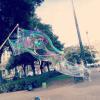April 10, 2016 - 20:33

Three trains passed, on their way from Villanova to the parade in Philadelphia, without stopping. I eventually just took a cab to the center. By that point, I was late, but I was still there to help with clean-up. “Hope”, the woman who had told me on a previous visit that she didn’t want to go home, that the people there were rude and it was too far away, came up to me, said she had missed me, and told me excitedly that she was getting a new apartment, with different people, closer to the Center. I told her (truthfully) that I was very excited for her. Several other people came up to me, shook my hand, and either asked me my name or welcomed me back. I saw “Usmail” for the first time since I had helped him with his horse sculpture. He told me he was working with the painting instructor to paint realistic shadows on the horse.
As I went around, wrapping up paints, putting away supplies, and cleaning brushes, I talked to many people I had not spoken with before. This is my third visit, and finally I have become comfortable with the center’s culture of just saying “What?” when you haven’t quite caught what someone else has said. It had been uncomfortable on my first visit, but now it feels more comfortable and easy than I would have expected. It eliminates any possibility of miscommunication, which is important when working together with other people. The more I think about it, the more I wonder why just saying “okay” and pretending like you’ve understood what someone said is considered more acceptable among able people than asking for clarification.
As I was cleaning some paintbrushes, “Rebecca”, a woman who uses a wheelchair, came over and asked me whether I could clean her paintbrush and help her pack up her art supplies so she could bring them home with her. I did, and then she asked me to come over and help her unlock her locker and get the rest of her things ready to go. We had a few awkward moments, like when I was trying to figure out how to attach all of her various bags to her wheelchair, or when I had to find the best way to help her put her coat on. When I finally found a way that worked, she said I put her coat on her “just like [her] mom does”. That made me feel good.

Comments
awkwardness at the center
Submitted by smalina on April 11, 2016 - 00:18 Permalink
It's funny that you brought up feeling awkward, because I've been thinking over the last week about what happens that makes me feel awkward, and how I respond to it in different environments. What I quickly realized was that I never feel awkward at the center, and I think that's in part because awkwardness happens for me in moments when I act in ways that may not be "normal" or "acceptable," by accident. I fear that other people in my vicinity will notice and judge me. At the center, I do occasionally feel awkward when talking to the teaching artists, because I worry that neurotypical people are so used to social conventions (even at the place where they work, surrounded by neurodivergent people who engage in all different ways) that I will be judged for not knowing what to say, or for doing the wrong thing. But with the artists, I recognize that they have likely all experienced feeling judged or even punished for doing something that falls outside of social convention. I feel almost automatically accepted and appreciated for the unique qualities and ideas I bring to the space, and reminding myself of this on a conscious level helps alleviate any tendency I might have towards feeling awkward.
Comfort and Discomfort
Submitted by glombaguzm on April 12, 2016 - 10:22 Permalink
I'm happy to hear to you are becoming more comfortable in this space, that can be quite a relief. But I also think feeling discomfort can be a good thing. Being aware of your possitionality in this space can be quite uncomfortable, yet also very important. At the same time, this comfort probably allows for better interactions with the center go-ers.